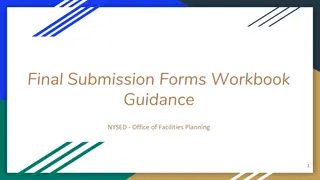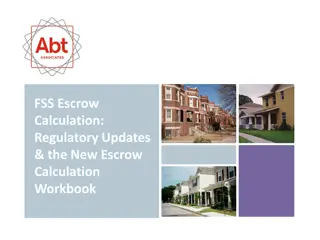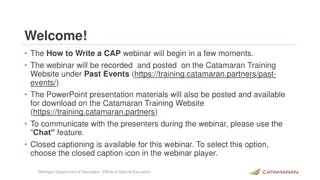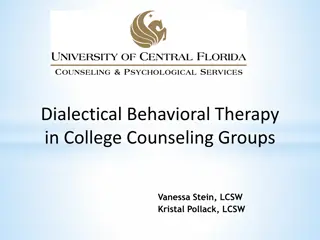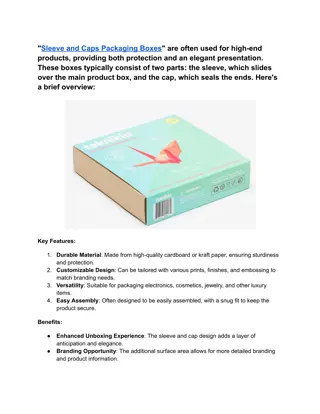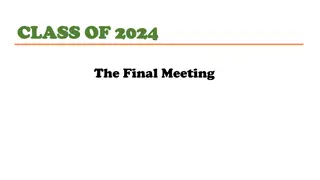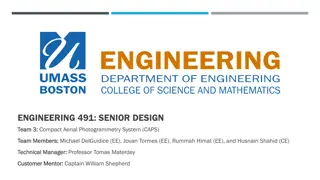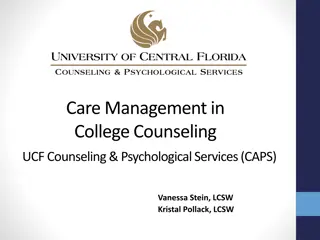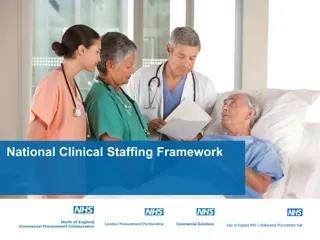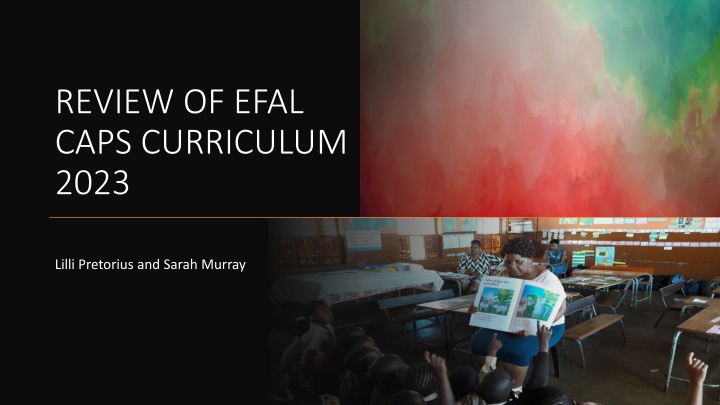
Enhancing EFAL Curriculum: Addressing Key Issues and Recommendations
Explore the review of the EFAL CAPS Curriculum 2023 by Lilli Pretorius and Sarah Murray, focusing on critical aspects such as instructional time, core curriculum, assessments, and oral language development. Discover recommendations for improving EFAL programs to better serve learners' needs.
Download Presentation

Please find below an Image/Link to download the presentation.
The content on the website is provided AS IS for your information and personal use only. It may not be sold, licensed, or shared on other websites without obtaining consent from the author. If you encounter any issues during the download, it is possible that the publisher has removed the file from their server.
You are allowed to download the files provided on this website for personal or commercial use, subject to the condition that they are used lawfully. All files are the property of their respective owners.
The content on the website is provided AS IS for your information and personal use only. It may not be sold, licensed, or shared on other websites without obtaining consent from the author.
E N D
Presentation Transcript
REVIEW OF EFAL CAPS CURRICULUM 2023 Lilli Pretorius and Sarah Murray
OUTLINE Background: Framing of review Main issues, problem areas and recommendations Instructional time Core curriculum Separation of content and pedagogy Oral Language and vocab EFAL Reading The role of SR and GGR Writing EFAL Assessment Discussion
FRAMING THE REVIEW FRAMING THE REVIEW HL reading skills Non-ideal education contexts in LMIC A curriculum mainly about what, not how Recouping Covid losses Overambitious curricula in LMIC? Factors affecting AL learning Instructional hours Systematic, explicit instruction Consolidating memory in AL learning Languages and literacy across the curriculum (through theme based language learning across HL and EFAL) Conceptual development EFAL Reading EFAL Oral language
EFAL FOR WHAT? EFAL FOR WHAT? We feel that it s important to distinguish more clearly between a curriculum for EFAL as LoLT and a more straightforward EFAL for general communication, i.e. EFAL to develop CALP not only BICs (as in translanguage models) The purpose of the EFAL determines time allocation, goals and focus of the AL programme
EFAL AS LOLT EFAL AS LOLT REFOCUSSES REFOCUSSES ISSUES ISSUES THEREBY THEREBY IDENTIFYING GAPS IDENTIFYING GAPS Time Core elements (Content) EFAL Assessment EFAL as LOLT Oral SR & GGR language & vocab EFAL Writing EFAL Reading
INSTRUCTIONAL TIME: INSTRUCTIONAL TIME: CURRENT PROBLEMS AND RECOMMENDATIIONS CURRENT PROBLEMS AND RECOMMENDATIIONS More instructional time needed for EFAL as LoLT than for plain EFAL Currently, a max of 3 hours per week (about 30min a day) At least 5 hours per week needed for EFAL as LoLT (at least an hour a day) Use Life Skills in a more integrative way to support language and literacy across the curriculum (e.g. to develop both HL and EFAL vocabulary around themes)
CORE CURRICULUM: CORE CURRICULUM: CURRENT PROBEMS AND RECOMMENDATIONS CURRENT PROBEMS AND RECOMMENDATIONS All schools must meet HL literacy benchmarks Split content and methodology (what to teach, how to teach it) Establish what is core language and vocabulary needed for LoLT (Need for corpus development ie most used words and common sentence patterns) EFAL as LOLT must also prioritise vocab and language goals. Schools that readily meet benchmarks can also do further reading and text work A diverse and unequal education system Teachers may chase the curriculum, without establishing basic language and literacy skills in either HL or EFAL Sometimes content and pedagogy are conflated
ORAL LANGUAGE AND VOCABULARY: ORAL LANGUAGE AND VOCABULARY: CURRENT PROBLEMS AND RECOMMENDATIONS CURRENT PROBLEMS AND RECOMMENDATIONS No strong links or guidelines for thematic language and vocab development Reliance on mainly oral learning in Grade 1 Vocabulary not systematically prominent; teachers don t know when to teach it, how many words to teach, or which words. Common sentence patterns not identified and no guidance to teach systematically. Thematic language teaching enhanced (linked to HL and LS and numeracy) Vocab goals made explicit and clear (number, content, whether oral vocab, reading vocab, or written vocab) Vocab assessment introduced in reading and writing as well as orally Explicit guidelines provided for how to reach vocab goals Explicit guidelines which sentence patterns to introduce and when
EFAL READING: EFAL READING: CURRENT PROBLEMS AND RECOMMENDATIIONS CURRENT PROBLEMS AND RECOMMENDATIIONS Introduce some oral English in Grade R including vocabulary, story book reading by teacher, poems and rhymes. Follow a basic English phonics/spelling programme, using well established one. Have a weekly spelling test from Term 2/3 (good phonics makes spelling easy). Begin simple reading (pattern sentences) in Term 2 of Grade 1, e.g. in Shared Reading Reinforce pattern sentence with substitution activities Read short stories aloud to children regularly for children to hear the language. Have simple, progressive learn to read (decodable) books or reading cards for reading practice from Term 2 . Make sure to reach EFAL ORF benchmarks in Grades 2 and 3 No EFAL reading in Grade 1 EFAL Phonics programme in Grades 2-3 not clear or systematic No guidelines for what successful EFAL reading looks like in Grades 2 and 3
EFAL WRITING: EFAL WRITING: CURRENT PROBLEMS AND RECOMMENDATIONS CURRENT PROBLEMS AND RECOMMENDATIONS Nice ideas but needs to be more systematic development Inadequate time for writing (15 mins per week in Grade 1) Very little attention given to spelling More systematic development of writing e.g. linking SR to SW for pattern and text development and to reinforce and consolidate language knowledge, e.g. using writing frames Link vocabulary development and assessment to phonics and spelling Build on genres and structures taught in HL
SR and GGR in EFAL: SR and GGR in EFAL: CURRENT PROBLEMS AND RECOMMENDATIONS CURRENT PROBLEMS AND RECOMMENDATIONS Teacher fronted lessons in early stages of AL learning can be effective GGR in Grade 3 EFAL as LoLT can be used for practicing, monitoring and assessing fluency in EFAL reading, while the class practices reading decodable texts in pairs or individually. Use SR for systematically developing sentence patterns and vocabulary; lead into Shared Writing Make greater use of good learner activity workbooks Provisioning of simple, progressive, decodable EFAL texts is important SR and GGR used ineffectively in EFAL SR can develop language, provide opportunities for practicing language patterns and vocabulary, and show learners how texts work; it does not develop decoding skills EFAL GGR is onerous and ineffective.
EFAL ASSESSMENT: EFAL ASSESSMENT: CURRENT PROBLEMS AND RECOMMENDATIONS CURRENT PROBLEMS AND RECOMMENDATIONS Lacks focus (all over the show), very time-consuming and mostly oral Complicated weighting system and time allocations for teaching sometimes mismatched with assessment weightings A more strategic and streamlined approach to assessment requirement Focus on explicitly providing content for core elements so these can be easily assessed. (phonics patterns, spelling words, sight words, thematic vocabulary, oral reading fluency targets, sentence patterns) Develop spelling lists for phonics development and assessment.
Strengthening academic literacy for EFAL as LoLT Build rich schemata across HL and EFAL to build background knowledge Develop word lists for the vocabulary required in Life Skills and Mathematics and ensure that it is taught explicitly in both HL and EFAL Develop lists of sentence patterns for reading and writing development can be linked to LS or Mathematics. Ensure children are exposed to extended texts daily, through shared reading and independent reading activities. Show learners how different genres work Show learners how different registers serve different functions and how they work. Academic literacy is invisible in the CAPS





